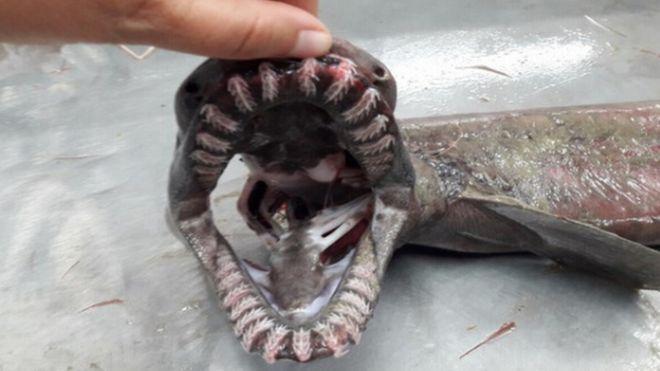Portuguese trawler catches 'prehistoric shark' during mission to 'minimise commercial fishing'
Shark 'from the age of the dinosaurs' netted by vessel off Algarve coast

Your support helps us to tell the story
From reproductive rights to climate change to Big Tech, The Independent is on the ground when the story is developing. Whether it's investigating the financials of Elon Musk's pro-Trump PAC or producing our latest documentary, 'The A Word', which shines a light on the American women fighting for reproductive rights, we know how important it is to parse out the facts from the messaging.
At such a critical moment in US history, we need reporters on the ground. Your donation allows us to keep sending journalists to speak to both sides of the story.
The Independent is trusted by Americans across the entire political spectrum. And unlike many other quality news outlets, we choose not to lock Americans out of our reporting and analysis with paywalls. We believe quality journalism should be available to everyone, paid for by those who can afford it.
Your support makes all the difference.Portuguese scientists have captured what they believe to be “a shark from the age of dinosaurs” off the Algarve coast.
The rare frilled shark was caught aboard a trawler, which was coincidentally working on a project for the European Union which concentrates on “minimising unwanted catches in commercial fishing".
According to a press release by the Alliance of Mediterranean News Agencies, scientists from the country’s Institute For The Sea and Atmosphere have dubbed the shark a “living fossil”, as remains of the shark date back around 80 million years.
The discovery of the shark – a male 1.5 metres in length (5ft) and caught at a depth of 700 metres (2,300ft) off the resort of Portimao - was considered a rare find.
The shark itself is little known in terms of it's biology or environment and is rarely caught.
The frilled shark's snake-like movements and elongated, eel-like body is said to have inspired sailors' stories of sea serpents, after Samuel Garman first studied the shark in 1884.

Professor Margarida Castro of the University of the Algarve told Sic Noticias that the shark gets its name from its frilled arrangement of 300 teeth, which allows the shark "to trap squid, fish and other sharks in sudden lunges."

The frilled shark has rarely been encountered alive, and thus poses no danger to humans, although scientists have accidentally cut themselves examining the species teeth.
Join our commenting forum
Join thought-provoking conversations, follow other Independent readers and see their replies
Comments